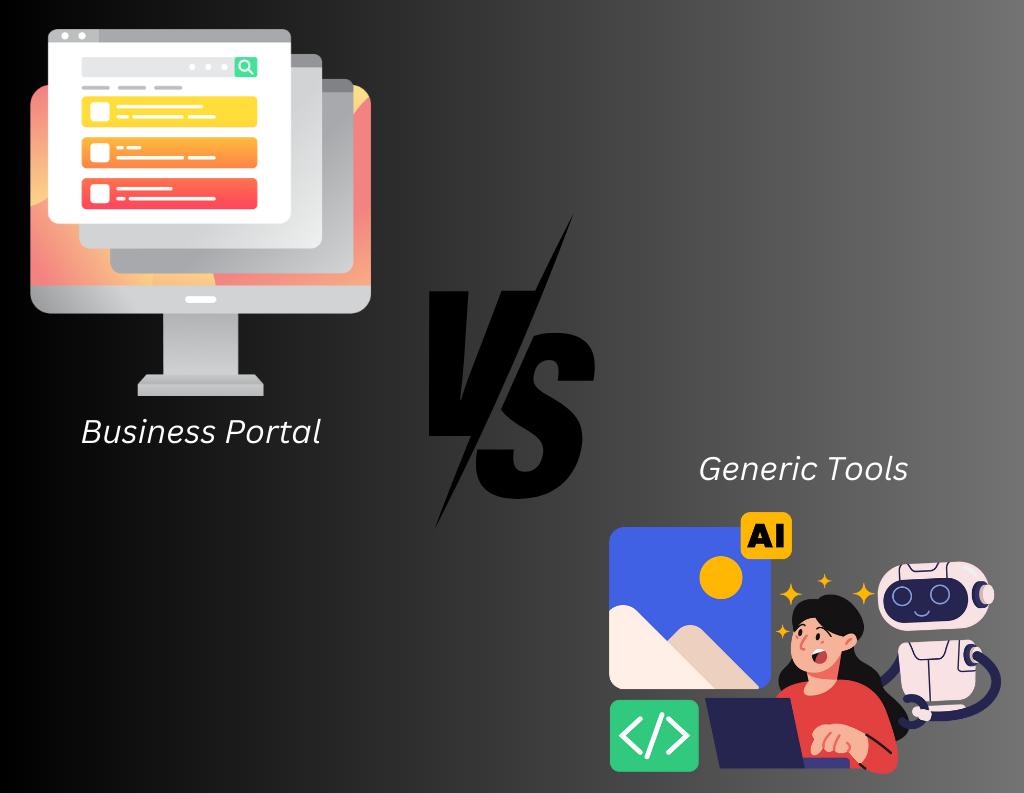Running a business comes with a unique set of challenges, from streamlining workflows to improving team collaboration. This is where the debate around ‘Business Portals vs Generic Tools: Why Customization Matters’ becomes crucial.
What Are Business Portals and Generic Tools?
Business Portals
A business portal is a centralized platform designed specifically for your business’s needs. It integrates multiple functions—like project management, inventory tracking, data sharing, and workflow automation—into one seamless system. Think of it as your business’s digital command center, tailored to how you work.
Generic Tools
On the other hand, generic tools are pre-built software solutions meant to work for a wide range of users. Tools like spreadsheets, email platforms, and basic project management apps fall into this category. These tools are accessible and often easy to use, but they rarely handle the unique complexities of individual businesses.

Key Differences Between Business Portals and Generic Tools
1. Customization vs. Standardization
The most obvious difference in ‘Business Portals vs Generic Tools: Why Customization Matters’ is customization. Business portals are built around your specific workflows, whereas generic tools follow a one-size-fits-all model. For instance, a customized portal integrates features for sales tracking, while generic tools require manual adjustments or multiple apps to achieve the same result.
2. Integration and Scalability
Business portals integrate seamlessly with your existing systems, like CRM or ERP software. This ensures smoother operations and eliminates data silos. Generic tools, while functional, often fail to scale effectively as your business grows. You might find yourself juggling multiple tools, which creates inefficiencies.
3. Efficiency and Productivity
A tailored portal streamlines workflows by automating repetitive tasks and centralizing key information. In contrast, generic tools bog down teams with manual processes and disconnected data. For example, why spend hours updating spreadsheets when a portal can handle it automatically?
Why Customization Matters
Adapting to Your Unique Processes
Every business considering ‘Business Portals vs Generic Tools: Why Customization Matters’ has unique workflows. A retail store might need a portal with inventory management and sales tracking, while a law firm requires case management and document sharing. A business portal integrates the exact features you need, ensuring smooth operations.
Improved User Experience
When tools don’t align with how teams work, employees struggle to adopt them. Custom portals fit your users’ needs, leading to higher engagement, faster onboarding, and less frustration—all of which boost productivity.
Cost-Efficiency in the Long Run
While a business portal may cost more upfront, the long-term savings are significant. It reduces inefficiencies, eliminates the need for multiple generic tools, and avoids costly errors from manual data handling. Think of it as an investment that grows with your business.

Real-World Comparison: Portals vs. Generic Tools
Let’s look at two scenarios to illustrate the difference:
Scenario 1: A retail business uses a customized portal to track inventory, manage sales, and generate real-time reports. Tasks are automated, reducing errors and freeing up time for strategic planning.
Scenario 2: Another retail business relies on spreadsheets for inventory and separate tools for sales tracking. Employees spend hours reconciling data, which leads to delays and missed opportunities.
The customized portal not only saves time but also provides insights that drive better decisions.
When to Choose a Business Portal
How do you know it’s time to invest in a business portal? Here are a few signs:
- Your processes are becoming too complex. If you’re managing multiple tools and workflows, it’s time for a unified solution.
- You’re struggling with data silos. A portal centralizes information, making it accessible and actionable.
- You’re scaling up. Generic tools often can’t keep up with growing demands.
Industries like retail, healthcare, real estate, and manufacturing especially benefit from portals due to their need for specialized workflows and robust reporting.
While generic tools can work for some tasks, they often fall short when it comes to the complex needs of growing businesses. A customized business portal adapts to your unique processes and enhances efficiency, scalability, and user satisfaction.
If you’re ready to take your operations to the next level, consider investing in a business portal designed specifically for you. Need help finding the right solution? Contact us today to explore how a customized portal can transform your business!
